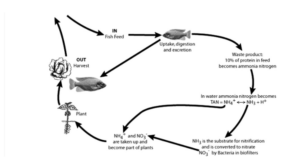Therese Thompson
Aquaponic systems combine fish and plant production in a system which utilizes recycled water and fish waste as fertilizer. Aquaponics are being considered as a way to sustainability produce both fish and vegetables by reducing water pollution and by improving soil quality despite the lack of soil in the aquaponics system. Aquaponics further increase food security to increase the potential for food production.

Figure 1: Traditional Aquaponic System [2]
How does an aquaponic system function?
A traditional aquaponic system is a closed food production system which functions based on the interactions between fish and their aqueous environment, plants, and bacteria. As depicted in figure 1 a fisheries system is connected with a plant growing system to reduce chemical fertiliser requirements for plant growth by utilising fish waste. Fish waste adds nitrate to water which is then pumped into the plant component of the system. The plants are grown hydroponically, with no soil but rather in water, and then the filtered water is returned into the fishery component. [2]

Figure 2: The Nitrogen Cycle in Aquaponics [3]
Nitrogen is an important aspect of plant growth. Figure 2 depicts the process of nitrogen being cycled through an aquaponic system, beginning as fish excretion and ammonia nitrogen becoming NH3 and thus being converted into nitrate to be taken up by plants. [3]
Aquaponics contain no soil… so how is soil affected?
Traditional plant production is heavily connected to soil sustainability. Plant production in a soil medium can be related to soil erosion, soil pollution by pesticides and animal waste and groundwater pollution by pesticides. However closed aquaponic systems can be operated waste free and thus if no new area is installed for production, aquaponic systems can have no effect on soil. [1] Taking soil out of the food production system can actually be more sustainable for soil.
How is water affected?
A major concern of water quality is eutrophication occurring due to fertiliser runoff as well as groundwater pollution from pesticide leaching. Within the closed aquaponics system, the possibility of fertiliser runoff and groundwater pollution is eliminated. [1] Additionally to be considered is the water saving aspect through recycling of water. Traditionally planting systems require continuous water inputs, however aquaponic systems recycle water making them beneficial for areas with water scarcity. However the dependency on water can be a limiting factor in the implementation of aquaponic systems in areas with little freshwater available. [1]
Food Security
Food production takes up a significant amount of land use, however aquaponic systems more efficiently utilise land and produce more food within the same area as traditional plant production, thus opening potential to increase the food supply. [1] Aquaponics may be grown in areas where food could otherwise be unable to grow due to poor soil conditions, thus increasing the land area which may be dedicated to food production. Additionally aquaponics brings in two sources of food, thus if a low season occurs in the fisheries aspect, farmers still produce vegetables, increasing the food security. [4]
Bibliography (please use APA reference style, BW)
[1] On the Sustainability of Aquaponics: Bettina König, Ranka Junge, Andras Bittsanszky, Morris Villarroel, Tamas Komives, Ecocycles
http://real.mtak.hu/39425/1/50_406_3_PB_u.pdf
[2] Smart Aquaponics System: Challenges and Opportunities: Shafeena T, European Journal of Advances in Engineering and Technology
http://citeseerx.ist.psu.edu/viewdoc/download?doi=10.1.1.1058.803&rep=rep1&type=pdf
[3] Opportunities and Challenges to Sustainability in Aquaponic Systems: Richard V. Tyson, Danielle D. Treadwell, and Eric H. Simonne, American Society for Horticultural Science
https://journals.ashs.org/horttech/view/journals/horttech/21/1/article-p6.xml
[4] Icreasing the Economical Efficiency and Sustainability of Indoor Fish Farming by Means of Aquaponics – Review: Flavius Blidariu, Adrian Grozea, Animal Science and Biotechnologies
https://cdn.aquaponicsassociation.org/uploads/2019/10/287-1177-1-SM.pdf